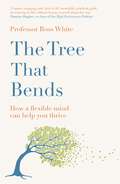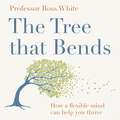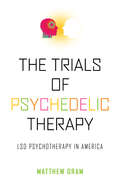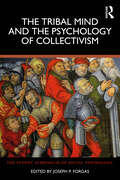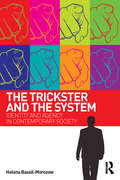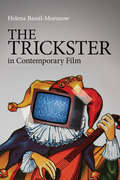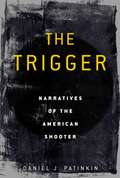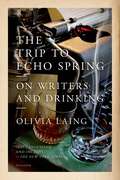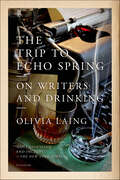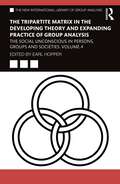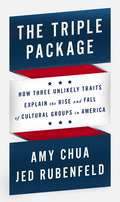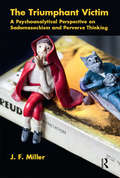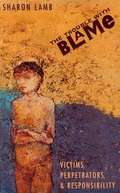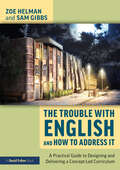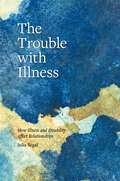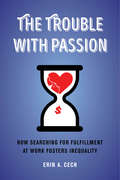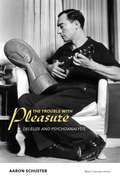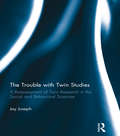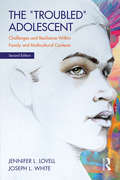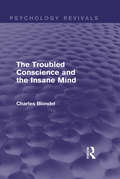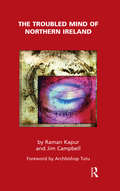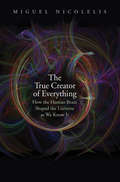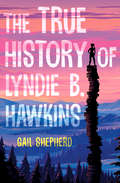- Table View
- List View
The Tree that Bends: How a flexible mind can help you thrive
by Dr Ross G White'Discover the wisdom within The Tree That Bends, a compelling exploration of embracing difficult emotions and acting in ways that are deeply meaningful' - Dr. Todd B. Kashdan, Professor of Psychology and author of The Upside of Your Dark Side and The Art of Insubordination: How to Dissent and Defy EffectivelyModern life urges us to push relentlessly for what looks like success and to be resolute in avoiding anything less. But at what cost? Burnout and disillusionment are on the rise.What if there is another way? One that allows us to both do well and feel well; an approach that transforms our striving into thriving?For clinical psychologist Ross White, a Tanzanian proverb - 'The wind does not break the tree that bends' signals the solution. During more than fifteen years as an expert in Acceptance and Commitment Therapy (ACT), he has supported countless high-performance clients to develop their psychological flexibility - to anchor themselves in the present, lean into their emotions and make choices in line with their personal values.If you juggle competing demands, take pride in what you do, and want to achieve your personal goals without sacrificing yourself, then high-performance applies to you too. With perspective-shifting insights and practical strategies, The Tree that Bends will help you to develop a flexible mind so that you can thrive, whatever storms life may throw at you.
The Tree that Bends: How a flexible mind can help you thrive
by Dr Ross G White'Discover the wisdom within The Tree That Bends, a compelling exploration of embracing difficult emotions and acting in ways that are deeply meaningful' - Dr. Todd B. Kashdan, Professor of Psychology and author of The Upside of Your Dark Side and The Art of Insubordination: How to Dissent and Defy EffectivelyModern life urges us to push relentlessly for what looks like success and to be resolute in avoiding anything less. But at what cost? Burnout and disillusionment are on the rise.What if there is another way? One that allows us to both do well and feel well; an approach that transforms our striving into thriving?For clinical psychologist Ross White, a Tanzanian proverb - 'The wind does not break the tree that bends' signals the solution. During more than fifteen years as an expert in Acceptance and Commitment Therapy (ACT), he has supported countless high-performance clients to develop their psychological flexibility - to anchor themselves in the present, lean into their emotions and make choices in line with their personal values.If you juggle competing demands, take pride in what you do, and want to achieve your personal goals without sacrificing yourself, then high-performance applies to you too. With perspective-shifting insights and practical strategies, The Tree that Bends will help you to develop a flexible mind so that you can thrive, whatever storms life may throw at you.
The Tree that Bends: How a flexible mind can help you thrive
by Dr Ross G White'Discover the wisdom within The Tree That Bends, a compelling exploration of embracing difficult emotions and acting in ways that are deeply meaningful' - Dr. Todd B. Kashdan, Professor of Psychology and author of The Upside of Your Dark Side and The Art of Insubordination: How to Dissent and Defy EffectivelyModern life urges us to push relentlessly for what looks like success and to be resolute in avoiding anything less. But at what cost? Burnout and disillusionment are on the rise.What if there is another way? One that allows us to both do well and feel well; an approach that transforms our striving into thriving?For clinical psychologist Ross White, a Tanzanian proverb - 'The wind does not break the tree that bends' signals the solution. During more than fifteen years as an expert in Acceptance and Commitment Therapy (ACT), he has supported countless high-performance clients to develop their psychological flexibility - to anchor themselves in the present, lean into their emotions and make choices in line with their personal values.If you juggle competing demands, take pride in what you do, and want to achieve your personal goals without sacrificing yourself, then high-performance applies to you too. With perspective-shifting insights and practical strategies, The Tree that Bends will help you to develop a flexible mind so that you can thrive, whatever storms life may throw at you.
The Trials of Psychedelic Therapy: LSD Psychotherapy in America
by Matthew OramThe rise—and fall—of research into the therapeutic potential of LSD.After LSD arrived in the United States in 1949, the drug's therapeutic promise quickly captured the interests of psychiatrists. In the decade that followed, modern psychopharmacology was born and research into the drug's perceptual and psychological effects boomed. By the early 1960s, psychiatrists focused on a particularly promising treatment known as psychedelic therapy: a single, carefully guided, high-dose LSD session coupled with brief but intensive psychotherapy. Researchers reported an astounding 50 percent success rate in treating chronic alcoholism, as well as substantial improvement in patients suffering from a range of other disorders. Yet despite this success, LSD officially remained an experimental drug only. Research into its effects, psychological and otherwise, dwindled before coming to a close in the 1970s. In The Trials of Psychedelic Therapy, Matthew Oram traces the early promise and eventual demise of LSD psychotherapy in the United States. While the common perception is that LSD's prohibition terminated legitimate research, Oram draws on files from the Food and Drug Administration and the personal papers of LSD researchers to reveal that the most significant issue was not the drug's illegality, but the persistent question of its efficacy. The landmark Kefauver-Harris Drug Amendments of 1962 installed strict standards for efficacy evaluation, which LSD researchers struggled to meet due to the unorthodox nature of their treatment.Exploring the complex interactions between clinical science, regulation, and therapeutics in American medicine, The Trials of Psychedelic Therapy explains how an age of empirical research and limited government oversight gave way to sophisticated controlled clinical trials and complex federal regulations. Analyzing the debates around how to understand and evaluate treatment efficacy, this book will appeal to anyone with an interest in LSD and psychedelics, as well as mental health professionals, regulators, and scholars of the history of psychiatry, psychotherapy, drug regulation, and pharmaceutical research and development.
The Tribal Mind and the Psychology of Collectivism (Sydney Symposium of Social Psychology)
by Joseph P. ForgasTribalism is a key evolutionary feature of humans, and the recent growth in tribal polarisation presents a serious challenge to our highly individualistic civilisation. This fascinating book examines the psychological origins and consequences of tribalism both in our private and in our public lives.The chapters explore how social, evolutionary, biological, and cognitive factors shape our tribal habits, featuring contributions from eminent international researchers. The chapters review the nature and origins of tribalism, the psychological mechanisms promoting tribalism, how tribal narratives can distort rationality and perceptions of reality, and the role of tribalism in politics and public affairs. The contributions investigate how insecurity, the search for meaning and attachment, victimhood, grievance, and cognitive shortcomings can facilitate tribal bonding and how such groups once formed can foster conflict, hatred, and irrational behaviours. The book suggests that the survival of our extremely successful civilisation based on the enlightenment values of liberty and individualism may well depend on our ability to understand and manage the human evolutionary propensity for tribalism.The book will be of great interest to students and researchers in psychology, sociology, and other disciplines of behavioural and social sciences, as well as all readers who seek to understand one of the most intriguing issues that shape human social life.
The Trickster and the System: Identity and agency in contemporary society
by Helena Bassil-MorozowFor centuries, the trickster has been used in various narratives, including mythological, literary and cinematic, to convey the idea of agency, rebellion and, often turbulent, progress. In The Trickster and the System: Identity and Agency in Contemporary Society, Helena Bassil-Morozow shows how the trickster can be seen as a metaphor to describe the psycho-anthropological concept of change, an impulse that challenges the existing order of things, a progressive force that is a-structural and anti-structural in its nature. The book is about being able to see things from an unusual, even ‘odd’, perspective, which does not coincide with the homogenous normality of the mass, or the social system, or a political ideology, or some other kind of authority. The Trickster and the System offers an analytical paradigm which can be used to examine relationships between tricksters and systems, change and stability, in a wide range of social, political and cultural contexts. It covers a range of systems, describes different types of tricksters and discusses possible conflicts, tensions and dialogues between the two opposing sides. One of the central ideas of the book is that social systems use shame as a tool to control and manage all kinds of tricksters – individuality, agency, creativity, spontaneity, innovation and initiative, to name but a few. The author argues that any society that neglects its tricksters (agents of change), ends up suffering from decay, stagnation – or even mass hysterical outbursts. The Trickster and the System: Identity and Agency in Contemporary Society provides a fresh perspective on the trickster figure in a variety of cultural contexts. It covers a range of psychological, cultural, social and political phenomena, from personal issues to the highest level of society’s functioning: self-esteem and shame, lifestyle and relationships, creativity and self-expression, media, advertising, economy, political ideology and, most importantly, human identity and authenticity. The book is essential reading for scholars in the areas of psychoanalysis, analytical psychology, myth, cultural and media studies, narrative analysis, cultural anthropology, as well as anyone interested in critical issues in contemporary culture. Helena Bassil-Morozow is a cultural philosopher, film scholar and academic writer whose many publications include Tim Burton: The Monster and the Crowd (Routledge, 2010) and The Trickster in Contemporary Film (Routledge, 2011). Helena is currently working on another Routledge project, Jungian Film Studies: the Essential Guide (co-authored with Luke Hockley). Her principal academic affiliation is the University of Bedfordshire, Faculty of Creative Arts, Technologies & Science.
The Trickster in Contemporary Film
by Helena Bassil-MorozowThis book discusses the role of the trickster figure in contemporary film against the cultural imperatives and social issues of modernity and postmodernity, and argues that cinematic tricksters always reflect psychological, economic and social change in society. It covers a range of films, from Charlie Chaplin’s classics such as Modern Times (1936) and The Great Dictator (1940) to contemporary comedies and dramas with ‘trickster actors’ such as Jim Carrey, Sacha Baron-Cohen, Andy Kaufman and Jack Nicholson. The Trickster in Contemporary Film offers a fresh perspective on the trickster figure not only in cinema but in Western culture in general. Alongside original film analyses, it touches upon a number of psychosocial issues including sovereignty of the individual, tricksterish qualities of the media, and human relationships in the mercurial digital age. Further topics of discussion include: common motifs in trickster narratives the trickster and personal relationships gonzo-trickster and the art of comic insurrection. Employing a number of complementary approaches such as Jungian psychology, film semiotics, narrative structure theories, Victor Turner’s concept of liminality and Mikhail Bakhtin’s theory of the carnivalesque, this book is essential reading for students and scholars of film, as well as anyone with an interest in analytical psychology and wider critical issues in contemporary culture.
The Trigger: Narratives of the American Shooter
by Daniel J. PatinkinSix moving profiles reveal the complex realities behind gun violence in the United States. These are the stories of the shooters.In South Carolina, a young man embarks on a life of crime that culminates in a drug-related shooting and decades in prison; in Chicago, an off-duty police officer engages in a shootout with a murderous gunman, saving a fellow patrolman; in rural Tennessee, a troubled teenager shoots her abusive father in his sleep. The Trigger recounts the dramatic life stories of six individuals who have shot someone in America.In 2017, over 15,000 were killed and over 31,000 were injured by gunfire. Faced with these desensitizing statistics, one easily forgets that each incident is perpetrated by a living, feeling human being who has walked a unique path. The causes and consequences of these violent acts are often far more complicated than one might expect.Author Daniel J. Patinkin exhaustively interviewed each of six shooters about their life experiences and about the unique circumstances that compelled them to use a firearm against another person. The result is a series of profound narratives that is sure to distress and challenge the reader, but also, perhaps, to provide enlightenment and inspiration.
The Trip to Echo Spring: On Writers and Drinking
by Olivia LaingIn this book, the author takes a journey across America, examining the links between creativity and alcohol in the work and lives of six extraordinary men: F. Scott Fitzgerald, Ernest Hemingway, Tennessee Williams, John Berryman, John Cheever, and Raymond Carver. Captivating and highly original, this book strips away the myth of the alcoholic writer to reveal the terrible price creativity can exert.
The Trip to Echo Spring: On Writers and Drinking
by Olivia LaingA New York Times Notable Book of 2014A TimeMagazine Notable Book of 2014Olivia Laing's widely acclaimed account of how writers in the grip of alcoholism created some of the greatest works of American literatureIn The Trip to Echo Spring, Olivia Laing examines the link between creativity and alcohol through the work and lives of six extraordinary men: F. Scott Fitzgerald, Ernest Hemingway, Tennessee Williams, John Berryman, John Cheever, and Raymond Carver.All six of these writers were alcoholics, and the subject of drinking surfaces in some of their finest work, from Cat on a Hot Tin Roof to A Moveable Feast. Often, they did their drinking together: Hemingway and Fitzgerald ricocheting through the cafés of Paris in the 1920s; Carver and Cheever speeding to the liquor store in Iowa in the icy winter of 1973.Olivia Laing grew up in an alcoholic family herself. One spring, wanting to make sense of this ferocious, entangling disease, she took a journey across America that plunged her into the heart of these overlapping lives. As she travels from Cheever's New York to Williams's New Orleans, and from Hemingway's Key West to Carver's Port Angeles, she pieces together a topographical map of alcoholism, from the horrors of addiction to the miraculous possibilities of recovery.Beautiful, captivating, and original, The Trip to Echo Spring strips away the myth of the alcoholic writer to reveal the terrible price creativity can exert.
The Tripartite Matrix in the Developing Theory and Expanding Practice of Group Analysis: The Social Unconscious in Persons, Groups and Societies: Volume 4 (The New International Library of Group Analysis)
by Earl HopperThe Tripartite Matrix in the Developing Theory and Expanding Practice of Group Analysis explores the social unconscious in persons, groups and societies in terms of the "un-acknowledged" restraints and constraints of our social and cultural groupings. In this context, Earl Hopper and an international team of contributors elucidate the theory and concept of the tripartite matrix as a tool for the deeper understanding of the human condition and for clinical work in various settings. They consider topics ranging from envy to intersectionality, and from addiction to the inability to mourn. The Tripartite Matrix in the Developing Theory and Expanding Practice of Group Analysis will be of great interest to group analysts, psychoanalytical group therapists, psychoanalysts and psycho-dramatists, as well as to social scientists more generally. Its extensive bibliography will be of particular value to students.
The Triple Package: How Three Unlikely Traits Explain The Rise And Fall Of Cultural Groups In America
by Amy Chua Jed Rubenfeld"That certain groups do much better in America than others—as measured by income, occupational status, test scores, and so on—is difficult to talk about. In large part this is because the topic feels racially charged. The irony is that the facts actually debunk racial stereotypes. There are black and Hispanic subgroups in the United States far outperforming many white and Asian subgroups. Moreover, there’s a demonstrable arc to group success—in immigrant groups, it typically dissipates by the third generation—puncturing the notion of innate group differences and undermining the whole concept of 'model minorities.'"<P> Mormons have recently risen to astonishing business success. Cubans in Miami climbed from poverty to prosperity in a generation. Nigerians earn doctorates at stunningly high rates. Indian and Chinese Americans have much higher incomes than other Americans; Jews may have the highest of all.<P> Why do some groups rise? Drawing on groundbreaking original research and startling statistics, The Triple Package uncovers the secret to their success. A superiority complex, insecurity, impulse control—these are the elements of the Triple Package, the rare and potent cultural constellation that drives disproportionate group success. The Triple Package is open to anyone. America itself was once a Triple Package culture. It’s been losing that edge for a long time now. Even as headlines proclaim the death of upward mobility in America, the truth is that the oldfashioned American Dream is very much alive—butsome groups have a cultural edge, which enables them to take advantage of opportunity far more than others.<P> • Americans are taught that everyone is equal, that no group is superior to another. But remarkably, all of America’s most successful groups believe (even if they don’t say so aloud) that they’re exceptional, chosen, superior in some way.<P> • Americans are taught that self-esteem—feeling good about yourself—is the key to a successful life. But in all of America’s most successful groups, people tend to feel insecure, inadequate, that they have to prove themselves.<P> • America today spreads a message of immediate gratification, living for the moment. But all of America’s most successful groups cultivate heightened discipline and impulse control.<P> But the Triple Package has a dark underside too. Each of its elements carries distinctive pathologies; when taken to an extreme, they can have truly toxic effects. Should people strive for the Triple Package? Should America? Ultimately, the authors conclude that the Triple Package is a ladder that should be climbed and then kicked away, drawing on its power but breaking free from its constraints.<P> Provocative and profound, The Triple Package will transform the way we think about success and achievement.
The Triumphant Victim: A Psychoanalytical Perspective on Sadomasochism and Perverse Thinking
by J.F. MillerThis book examines the unrecognised prevalence of sadomasochism and perverse thinking in personal relationships as well as the public domain, and discusses the way it contributes to the culture of the victim.The first part traces the origins of perverse pathology and how it operates in obstructing emotional development and producing dysfunctional relationships. This is put in the context of hysteria, exhibitionism, voyeurism, and projective identification and is illustrated with clinical material drawn from the author's thirty years of psychoanalytical practice as well as experiences of couple- and family-therapy and educational consultations. The second half of the book examines current modes of thinking and belief systems with particular emphasis on tribal, basic-assumption mentality. The author examines the legacy of Cartesian dualism and the Enlightenment in contributing to the marginalization of feminine values in favour of negative, masculine control. Fundamentalist belief, the 'New Atheism' and feminism are subjected to particular scrutiny for evidence of perverse thinking leading to internal contradictions and the manifestation of these in the consulting room is illustrated with clinical material.
The Trouble with Blame: Victims, Perpetrators, and Responsibility
by Sharon LambBlame Society. Blame a bad upbringing. Blame the circumstances. Blame the victim - she may even blame herself. But what about the perpetrator? When the blame is all assigned, will anyone be left to take responsibility? This powerful book takes up the disturbing topic of victimization and blame as a pathology of our time and its consequences for personal responsibility. By probing the psychological dynamics of victims and perpetrators of rape, sexual abuse, and domestic violence, Sharon Lamb seeks to answer some crucial questions: How do victims become victims and sometimes perpetrators? How can we break the psychological pattern of perpetrators blaming others and victims blaming themselves? How do victims and perpetrators view their actions and reactions? And how does our social response to them facilitate patterns of excuse? With clarity and compassion, Lamb examines the theories, excuses, and psychotherapies that strip victims of their power and perpetrators of their agency - and thus deprive them of the means to human dignity, healing, and reparation. She shows how the current practice of painting victims as pure innocents may actually help perpetrators of abuse shirk responsibility for their actions; they too can claim to be victims in their own right, passive and will-less in their wrongdoing.
The Trouble with English and How to Address It: A Practical Guide to Designing and Delivering a Concept-Led Curriculum
by Zoe Helman Sam GibbsThis essential book will help English teachers to address the challenges and opportunities in creating a powerful, knowledge-rich, concept-led curriculum, which draws on lived experience and engages with cognitive science and other educational research. It explores persistent problems in the teaching of English, why we have struggled to address them and how we can go about creating a curriculum which enables all pupils to achieve. Written by experienced English teachers and teacher educators, the book empowers teachers to reclaim their subject as one which has the power to change lives, and to deliver it with passion and authenticity. The Trouble with English and How to Address It contains: A detailed exploration of the challenges English teachers face in designing and delivering a rigorous, coherent, sequenced curriculum An overview of the implications of cognitive science research for the teaching of English Approaches to building a powerful, knowledge-rich curriculum which encompasses concepts, contexts and content in English Suggestions for how to use curriculum design and implementation as a training opportunity in departments Practical strategies for English teachers which provide the link between cognitive science research and their classroom practice To equip leaders and classroom teachers with everything they might need to improve their provision, this book provides a forensic account of what to change, why and how, moving from the big picture into fine details about what we might see in a highly successful English classroom.
The Trouble with Illness: How Illness and Disability Affect Relationships
by Julia SegalThis impressively honest book explores the effects a challenging disability or illness can have on the mind and personal relationships, and how friends, family and professionals can help. Illness or disability can isolate people by creating vast differences in their experiences where previously there were none. Friends and family can find themselves saying the wrong thing or awkwardly avoiding topics as a result. This book takes a candid look at how discomfort caused by an illness can strain a relationship between partners, families and professionals, as well as how understanding feelings of guilt or shame can transform a situation or relationship. The insights and advice offered in this book can help children and adolescents overcome anxiousness caused by a parent's condition, improve communication between partners and family members, and increase professionals' awareness of how a client feels about their situation.
The Trouble with Passion: How Searching for Fulfillment at Work Fosters Inequality
by Erin CechProbing the ominous side of career advice to "follow your passion," this data-driven study explains how the passion principle fails us and perpetuates inequality by class, gender, and race; and it suggests how we can reconfigure our relationships to paid work. "Follow your passion" is a popular mantra for career decision-making in the United States. Passion-seeking seems like a promising path for avoiding the potential drudgery of a life of paid work, but this "passion principle"—seductive as it is—does not universally translate. The Trouble with Passion reveals the significant downside of the passion principle: the concept helps culturally legitimize and reproduce an exploited, overworked white-collar labor force and broadly serves to reinforce class, race, and gender segregation and inequality. Grounding her investigation in the paradoxical tensions between capitalism's demand for ideal workers and our cultural expectations for self-expression, sociologist Erin A. Cech draws on interviews that follow students from college into the workforce, surveys of US workers, and experimental data to explain why the passion principle is such an attractive, if deceptive, career decision-making mantra, particularly for the college educated. Passion-seeking presumes middle-class safety nets and springboards and penalizes first-generation and working-class young adults who seek passion without them. The ripple effects of this mantra undermine the promise of college as a tool for social and economic mobility. The passion principle also feeds into a culture of overwork, encouraging white-collar workers to tolerate precarious employment and gladly sacrifice time, money, and leisure for work they are passionate about. And potential employers covet, but won't compensate, passion among job applicants. This book asks, What does it take to center passion in career decisions? Who gets ahead and who gets left behind by passion-seeking? The Trouble with Passion calls for citizens, educators, college administrators, and industry leaders to reconsider how we think about good jobs and, by extension, good lives.
The Trouble with Pleasure: Deleuze and Psychoanalysis (Short Circuits)
by Aaron SchusterAn investigation into the strange and troublesome relationship to pleasure that defines the human being, drawing on the disparate perspectives of Deleuze and Lacan. Is pleasure a rotten idea, mired in negativity and lack, which should be abandoned in favor of a new concept of desire? Or is desire itself fundamentally a matter of lack, absence, and loss? This is one of the crucial issues dividing the work of Gilles Deleuze and Jacques Lacan, two of the most formidable figures of postwar French thought. Though the encounter with psychoanalysis deeply marked Deleuze's work, we are yet to have a critical account of the very different postures he adopted toward psychoanalysis, and especially Lacanian theory, throughout his career. In The Trouble with Pleasure, Aaron Schuster tackles this tangled relationship head on. The result is neither a Lacanian reading of Deleuze nor a Deleuzian reading of Lacan but rather a systematic and comparative analysis that identifies concerns common to both thinkers and their ultimately incompatible ways of addressing them. Schuster focuses on drive and desire—the strange, convoluted relationship of human beings to the forces that move them from within—“the trouble with pleasure." Along the way, Schuster offers his own engaging and surprising conceptual analyses and inventive examples. In the “Critique of Pure Complaint” he provides a philosophy of complaining, ranging from Freud's theory of neurosis to Spinoza's intellectual complaint of God and the Deleuzian great complaint. Schuster goes on to elaborate, among other things, a theory of love as “mutually compatible symptoms”; an original philosophical history of pleasure, including a hypothetical Heideggerian treatise and a Platonic theory of true pleasure; and an exploration of the 1920s “literature of the death drive,” including Thomas Mann, Italo Svevo, and Blaise Cendrars.
The Trouble with Twin Studies: A Reassessment of Twin Research in the Social and Behavioral Sciences
by Jay JosephThe Trouble with Twin Studies questions popular genetic explanations of human behavioral differences based upon the existing body of twin research. Psychologist Jay Joseph outlines the fallacies of twin studies in the context of the ongoing decades-long failure to discover genes for human behavioral differences, including IQ, personality, and the major psychiatric disorders. This volume critically examines twin research, with a special emphasis on reared-apart twin studies, and incorporates new and updated perspectives, analyses, arguments, and evidence.
The Troubled Adolescent: Challenges and Resilience within Family and Multicultural Contexts
by Joseph L. White Jennifer L. LovellThis book is written for students and clinicians who want to learn about adolescent behavioral health and psychosocial development. It focuses on the experiences of culturally diverse adolescents and families including, but not limited to, diversity based on race, ethnicity, gender identity, sexual orientation, spirituality, ability/disability status, age, nationality, language, and socioeconomic status. Written from a bioecological and strength-based perspective, it views adolescents as having the power to initiate growth and recover from setbacks.
The Troubled Conscience and the Insane Mind (Psychology Revivals)
by Charles BlondelOriginally published in 1928 in the Psyche Miniatures Medical Series, this title was an attempt to bring to the attention of British psychologists and psychiatrists some aspects of the work and thought of French psychologist Charles Blondel. Well known abroad but little known in England at the time, he was professor of Psychology at the University of Strasbourg and founder of a school of ‘morbid psychology’. This book contains two papers, the first concerning the theory of the disordered mind and the second deals with the relation between disordered thought and speech. Today it can be read and enjoyed in its historical context.
The Troubled Mind of Northern Ireland: An Analysis of the Emotional Effects of the Troubles
by Jim Campbell Raman KapurThe "Troubles" in Northern Ireland have endured for so long that eventually the abnormal has become normal. This volume examines the processes by which society has become gradually dehumanised, and how the inhuman conditions, under which people have been forced to live so long, have come about. The authors seek to understand this situation and build upon the current literature, using their different personal and professional backgrounds to great effect to create a wider perspective. They describe the political background, the framework of Kleinian psychoanalysis, and then bring the two together to create a new foundation from which to move from a troubled mind to a mind at peace.
The True Believer: Thoughts on the Nature of Mass Movements
by Eric HofferTalks about mass movements and human irrationality.
The True Creator of Everything: How the Human Brain Shaped the Universe as We Know It
by Miguel NicolelisA radically new cosmological view from a groundbreaking neuroscientist placing the human brain at the center of humanity’s universe Renowned neuroscientist Miguel Nicolelis introduces readers to a revolutionary new theory of how the human brain evolved to become an organic computer without rival in the known universe. Nicolelis undertakes the first attempt to explain the entirety of human history, culture, and civilization based on a series of recently uncovered key principles of brain function. This new cosmology is centered around three fundamental properties of the human brain: its insurmountable malleability to adapt and learn; its exquisite ability to allow multiple individuals to synchronize their minds around a task, goal, or belief; and its incomparable capacity for abstraction. Combining insights from such diverse fields as neuroscience, mathematics, evolution, computer science, physics, history, art, and philosophy, Nicolelis presents a neurobiologically based manifesto for the uniqueness of the human mind and a cautionary tale of the threats that technology poses to present and future generations.
The True History of Lyndie B. Hawkins
by Gail ShepherdA one-of-a-kind voice lights up this witty, heartwarming debut set in 1985 Tennessee about the power of homespun wisdom (even when it's wrong), the clash between appearances and secrets, and the barriers to getting help even when it's needed most. <P><P>Lyndie B. Hawkins loves history, research, and getting to the truth no matter what. But when it comes to her family, her knowledge is full of holes. Like, what happened to her father in the Vietnam War? Where does he disappear to for days? And why exactly did they have to move in with her grandparents? <P><P>Determined to mold recalcitrant Lyndie into a nice Southern girl even if it kills her, her fusspot grandmother starts with lesson number one: Family=Loyalty=keeping quiet about family secrets. Especially when it comes to Lyndie's daddy. <P><P>Then DB, a boy from the local juvenile detention center comes to stay with Lyndie's best friend, Dawn. He's as friendly and open as a puppy. There to shape up his act, he has an optimism that's infectious. But it puts Lyndie in direct opposition to her grandmother who'd rather keep up appearances than get her son the help he needs.
